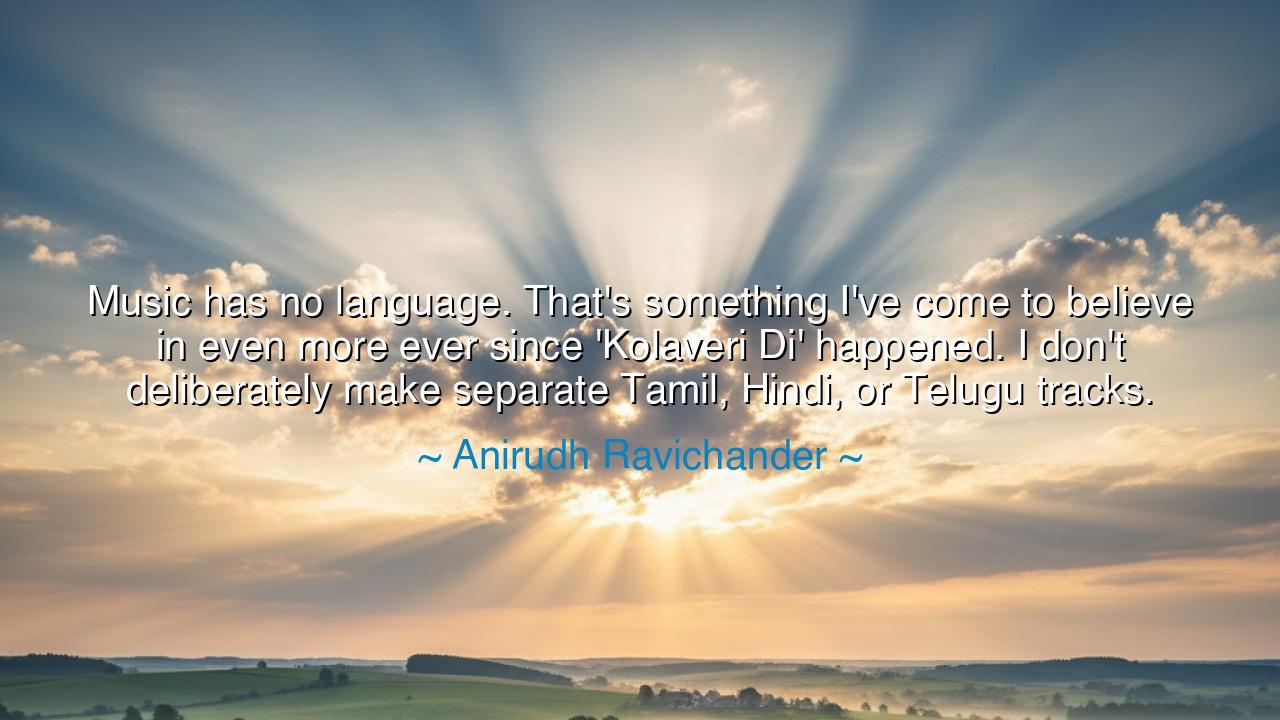
Music has no language. That's something I've come to believe in
Music has no language. That's something I've come to believe in even more ever since 'Kolaveri Di' happened. I don't deliberately make separate Tamil, Hindi, or Telugu tracks.






When Anirudh Ravichander declared, “Music has no language. That's something I've come to believe in even more ever since 'Kolaveri Di' happened. I don't deliberately make separate Tamil, Hindi, or Telugu tracks,” he spoke from the experience of one who had seen sound transcend the boundaries of nation and tongue. His words remind us that music is not chained by syllables, alphabets, or dialects. It flows deeper than the mind; it flows into the heart. It bypasses the grammar of speech and speaks instead in the eternal language of rhythm, melody, and emotion.
The ancients too bore witness to this truth. In every culture, long before words were written, there were songs and chants. A mother’s lullaby did not require translation; the warrior’s drumbeat needed no interpreter. The cry of the flute, the thrum of the lyre, the rising chorus of voices—all these were understood not by intellect but by soul. Anirudh, in recalling the unexpected, global success of “Why This Kolaveri Di,” speaks from this same ancient well: that music which carries sincerity and joy will be embraced by all, even when its words are foreign.
Consider the story of Beethoven’s Ode to Joy. Written in German, its words were unfamiliar to millions beyond his homeland. And yet the melody soared beyond language, later becoming the anthem of Europe itself. It was not the tongue that made it immortal, but the spirit of its sound. In the same way, Anirudh found that a playful Tamil-English “soup song” reached listeners across continents, uniting people who shared no common tongue. Thus his belief was born—not in the power of lyrics, but in the universal truth that music has no language.
There is also in his words a rejection of division. Too often we confine art into boxes: this song is Tamil, that one is Hindi, this one belongs to one culture, that one to another. But Anirudh, like the masters before him, refuses such barriers. He does not “deliberately” craft separate works for separate groups—he creates from the heart, trusting that those who hear will respond to the feeling, not the label. In this, his philosophy reflects a heroic defiance against fragmentation: music must unite, not divide.
His insight also reminds us of the true measure of art. A painting is not judged by whether we understand the painter’s words, but by whether it stirs us. A song, likewise, is not diminished if we do not know the language. The Japanese ballad, the African chant, the Celtic hymn—though foreign to our ears—can move us to tears or joy. For what matters is not comprehension, but resonance. This is the power that makes music universal: it speaks in the unspoken language of the heart.
The lesson for us is clear: do not let the barriers of speech blind you to the unity of spirit. When you hear a song in a tongue you do not know, do not dismiss it—listen for the emotion, the rhythm, the truth hidden beneath syllables. And when you create, do not fear that your message will be lost; if it is sincere, it will be heard, for the heart recognizes what the tongue cannot explain.
Practically, this means opening yourself to the world’s sounds. Listen to music beyond your culture, embrace songs from distant lands, allow your soul to be touched by what your mind does not fully grasp. In daily life, too, remember this principle: connection is not always about words. A smile, a gesture, a song—these transcend speech. Live with the awareness that much of what is greatest in human life has no language at all.
Thus, Anirudh’s words resound like an ancient teaching in modern dress: music has no language. It is the cry of the heart, the laughter of the soul, the voice of the human spirit unchained by boundaries. Let us, then, embrace this truth—not only in music but in life itself—seeking always the common sound that unites us, rather than the words that divide. For in the end, what binds humanity is not what we speak, but what we feel.






AAdministratorAdministrator
Welcome, honored guests. Please leave a comment, we will respond soon